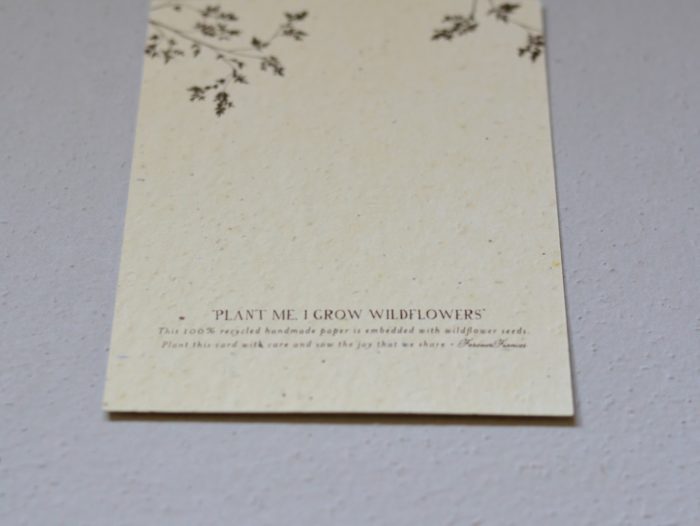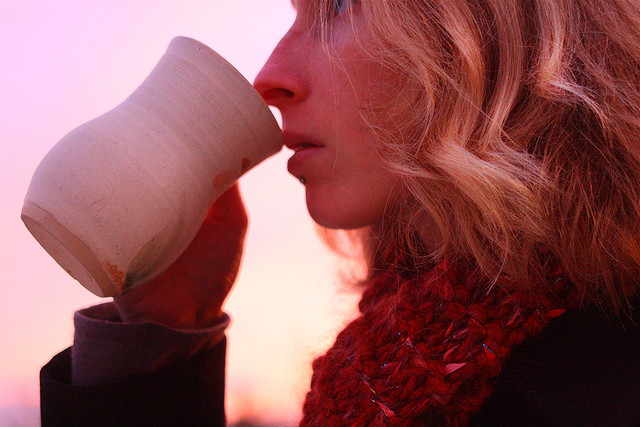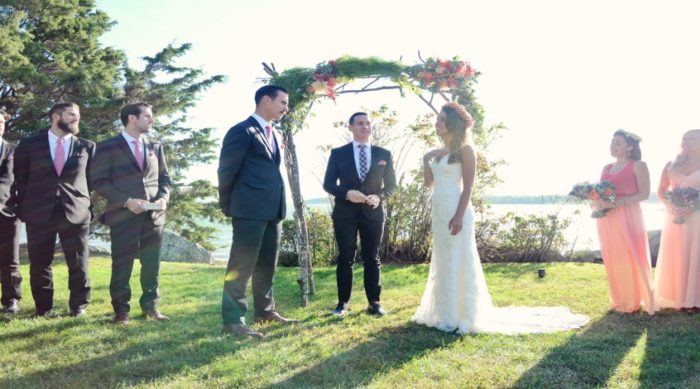
The trees have popped and lovely shades of pink and purple blossoms dot the increasingly green landscape. As we move into May we look forward to longer days, warmer weather, and–if you happen to fall within a particular age bracket–the inevitable start of wedding season, especially here in coastal southern New England.
- A version of this article previously appeared on A Peaceful Living.
I love weddings. They’re an excellent excuse to put on a fancy dress and get together to eat food and party with your nearest and dearest. I’m a bit biased, but my wedding was seriously the best night of my life.
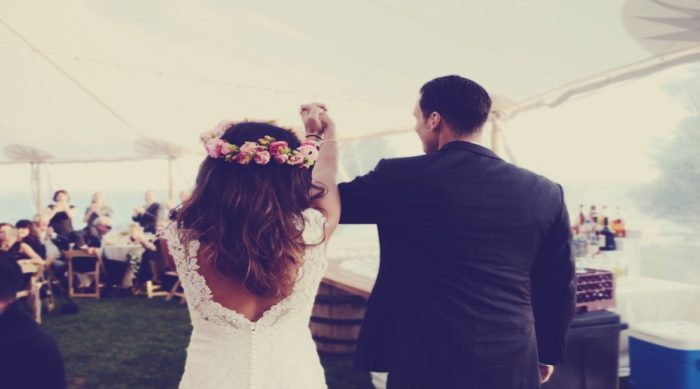
But, let’s face it, weddings can be super wasteful and not so eco-friendly.
Imagine this: You walk into the reception of a wedding and the tables are adorned with beautiful and elaborate floral centerpieces in which some of the stems appear to be suspended at angles that seem to defy gravity…. In this centerpiece, it’s more than likely the florist used floral foam to secure the stems firmly in place, or to achieve a more sculptural look or geometric shape.
Sounds innocuous enough, but not only is floral foam forever (it’s not biodegradable), it contains at least two potential carcinogens: carbon black and formaldehyde. Dry blocks of floral foam are especially dangerous to the florist as they risk inhaling floral foam dust before it is soaked in water for use.
Marriage is forever — but you don’t want the waste from your wedding to be.
This is just one example of something that could easily be omitted at your wedding if you know to be mindful about it.
When I look back on my day about three years ago, just as I was in the process going vegan and being more “aware”, if you will, of taking a more active role in my own personal environmental responsibility, I think of things I may have done differently- especially this day in age as we contend with environmental issues like global warming and water scarcity.
So, as you plan your big, beautiful day, consider being greener with the following sustainable ideas:
1. Use Local In-Season Flowers
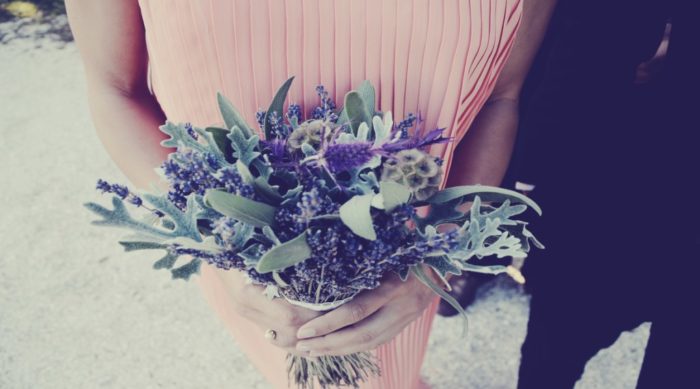
As I mentioned above, the use of floral foam really sucks the beauty out of an otherwise lovely floral arrangement. So, be sure to work with a floral designer who doesn’t use it. Or, just ask that it not be used.
Another easy way to reduce the carbon footprint of your day while also supporting the local economy is to make use of in-season, organic, locally grown flowers in your bouquet and arrangements.
From Debra Prinzing’s book The 50 Mile Bouquet , “As the demand for green flowers increases, the sources of chemical-free crops will also expand, allowing the local flower farmer to earn a living wage supplying designers, florists, and consumers in his or her own community.”
Prinzing’s book, along with her other books, are great resources for anyone who wants sustainable flowers at their wedding or just in general.
This also has the happy consequence of being nicer to your wallet! You’re going to spend a lot less on flowers that weren’t shipped in from other parts of the globe. For example, if you see plumeria or protea at a New England wedding, they traveled very far to get there and were doused in preservatives to help them look “fresh” despite being a week or two off the farm. Sourcing flowers in this way adds to your cost and also to the overall carbon footprint of your wedding.
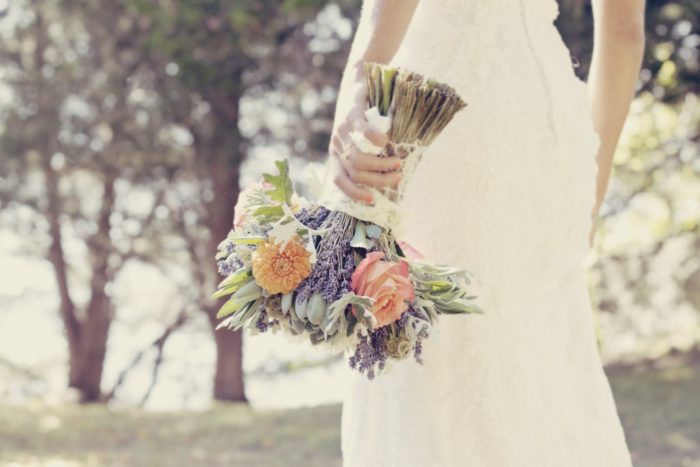
Another bonus of using local flowers is that you may even have the opportunity to visit the farm where they’re grown, which is a fun way to feel more connected to the entire process and the people involved.
Before my wedding my floral designer, Polly, of Robin Hollow Farm in Rhode Island, invited me to her farm where I was able to see rows upon rows of flowers, some of which were used on my wedding day. It was great to learn about the farm, their growing methods, and just have the opportunity to see the process from farm to vase.
If you really have your heart set on a specific flower then consider planning your wedding to fall within its growing season. For example, I really love dahlias and it just so happened that my wedding fell within their growing season where I live. I also really love lavender, but since my wedding fell outside of the lavender blooming season, we opted for dried lavender instead.
Prinzing is a proponent of using what is available in season and notes in The 50 Mile Bouquet, “Seasonality does not mean giving up on our floral traditions.” You just may need to refocus your concept or vision to account for what is seasonally available; you’ll likely be happily surprised by the beauty that can be found in local flowers that are perhaps less popularly used in conventional wedding bouquets.
2. Waste Free Decor
Along with your flowers, instead of using additional decor that will ultimately go to waste, consider renting decor from your floral designer if it’s available, or repurpose things you already have at home. For example, my husband and I used vintage bins and boxes to hold flowers, cards for guests to write to us, etc.
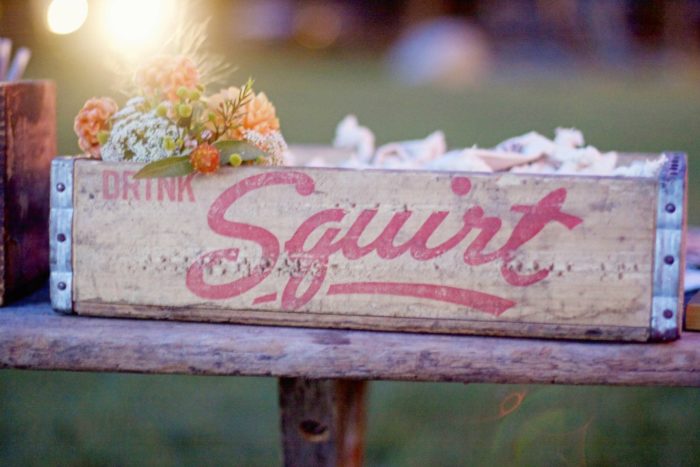
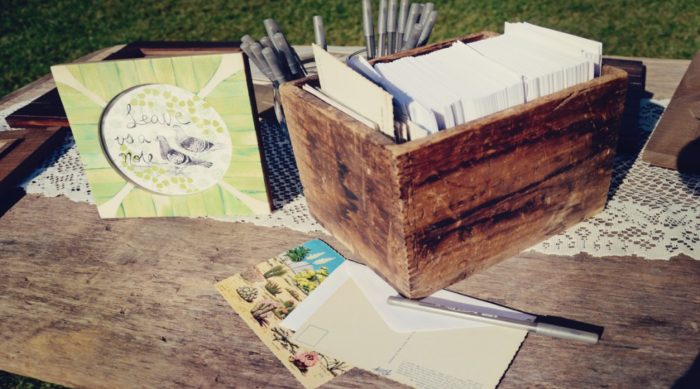
We also collected old/vintage jars and bottles in the months leading up to our wedding to use as part of the centerpieces. We still have the jars and use them at home for fresh flowers. Potted plants as part of the centerpieces can also be repotted or planted.
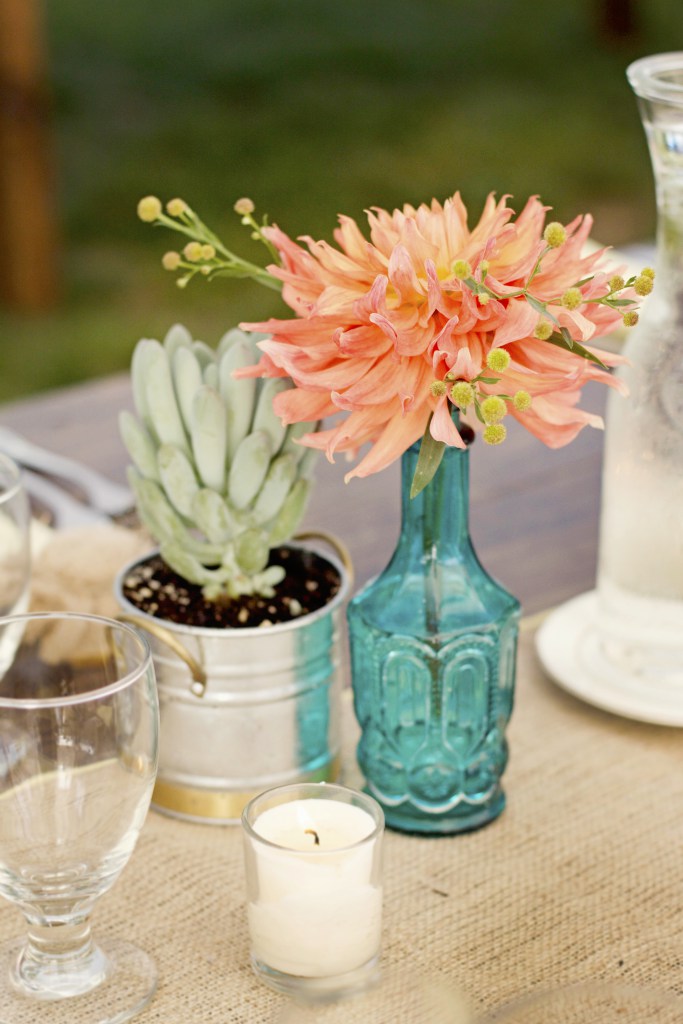
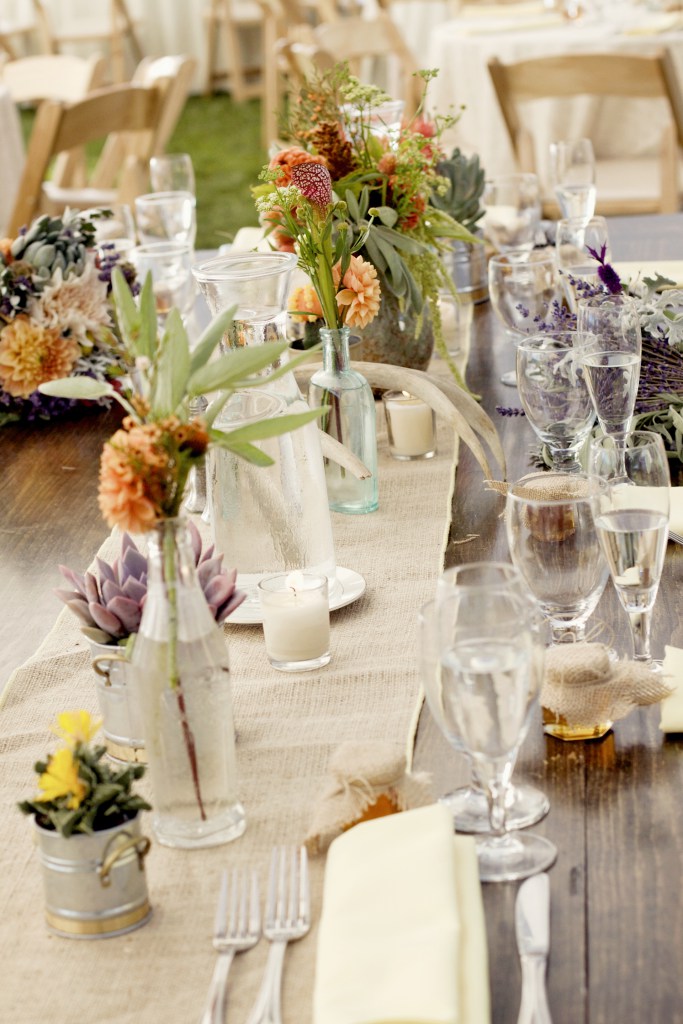
3. Re-think the Paper
Between save-the-dates and the actual invitations, replete with RSVP cards, travel info, and any other additional inserts, the amount of paper used for your wedding can add up quickly.
Instead of sending physical save-the-date cards, why not opt for an E-vite? If your guests would prefer a more tactile reminder, they can choose to print it themselves.
If you must send something, consider using post-consumer, recycled paper printed with vegetable based inks or send postcards to negate the need for envelopes.
For your invitations, you could also choose to print on recycled paper, or you could use seeded paper!
Gardening lovers, rejoice because plantable, seeded paper is the answer to your wedding invitation prayers.
Seeded paper is exactly what it sounds like–paper that has been embedded with seeds. Paper companies like Bloomin offer an array of invitations, favors, and DIY paper seeded with wildflowers while companies like Botanical Paper Works have an assortment of seeded paper offerings including papers embedded with wildflower seeds, herb seeds, and vegetable seeds.
Other eco-friendly invitation options include using tree-free paper. The tree-free papers from popular and easy-to-find paper company Crane & Co, are made from 100% cotton fibers recovered from the apparel industry.
4. Welcome Gifts & Wedding Favors
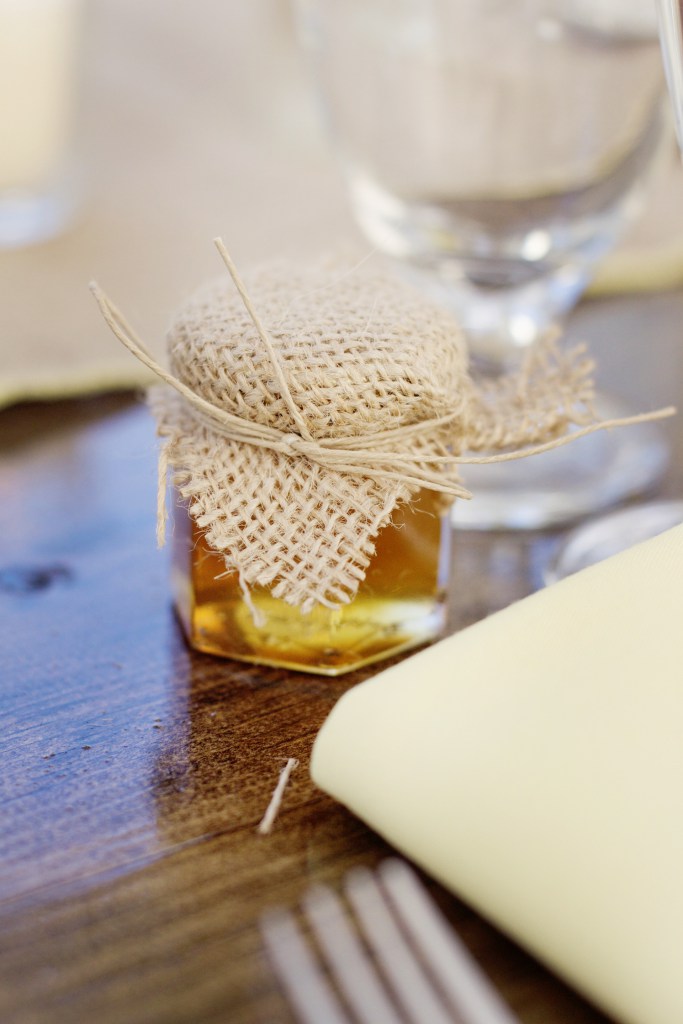
It’s customary to provide welcome gifts to guests traveling to your wedding. It’s easy enough to just stuff a bag with bottled water, prepackaged snacks, and maybe some wine or beer. But, opt for an eco-friendlier welcome gift by using a gift bag made from recycled paper. Or, if you have the funds, splurge on reusable linen totes that your guests can use again. Instead of bottled water, go for boxed, and reduce excessive packaging by including some fresh fruit like apples or bananas.
As far as favors at your wedding go, choose a more enduring gift that isn’t going to be forgotten about and tossed in the trash. Little potted plants, succulents, cacti, or air plants make great favors and also add to the decor. Potted kitchen herbs also add to the decor, smell great, and are actually useful.
For my wedding, my husband and I created seed bombs with wildflower seeds native to our neck-of-the-woods. We hand-stamped little, recycled cotton bags with a flower and popped the bombs inside. I’m sure not everyone used them, but I know for sure some of my guests did and even if they were ultimately tossed they’re made of organic material so no harm done. I had a lot of fun throwing the seed bombs around my yard and in various spots around town to see if any wildflowers grew.
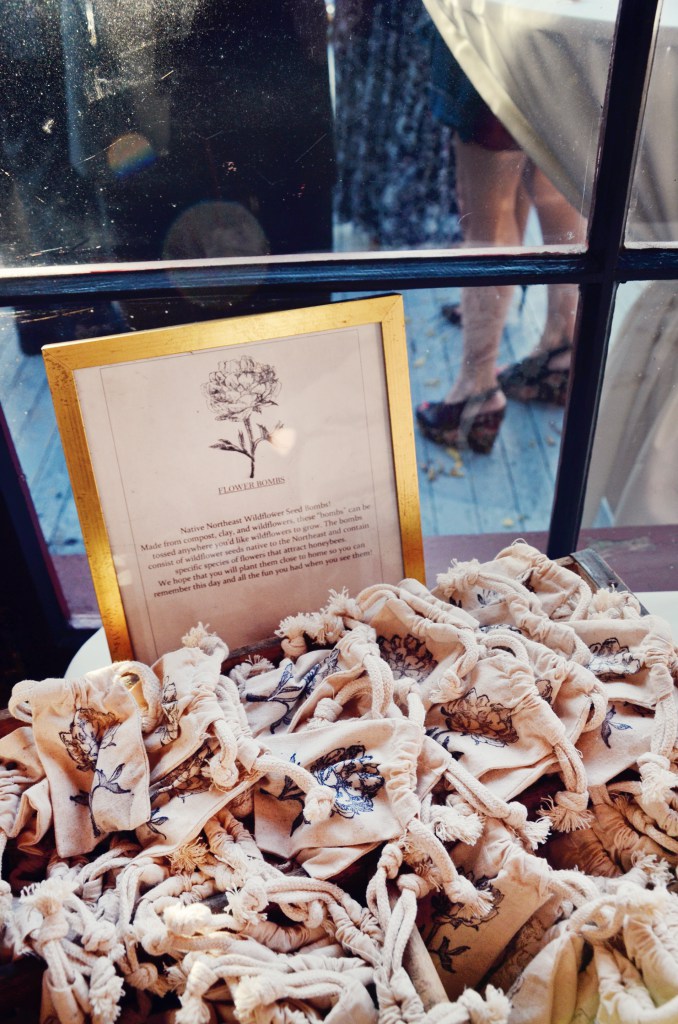
If you’re not much of a green thumb, but love to be in the kitchen, gifting your guests with jars of homemade jam or your favorite cake (or cookie or hot chocolate etc. etc.) mix is a tasty way to add a real personal touch. Since my dad is a beekeeper, for my wedding he jarred honey* to pair with the seed bombs – which was a blend of seeds intended to attract honeybees.
Lastly, you could forgo a take-home gift altogether and donate what you would have spent on each individual guest to a charity of your choice. In an effort to be really eco-friendly, consider donating to an environmental organization of some sort. Be sure to do your research before settling on a charity or non-profit – you’ll want to make sure that the bulk of your donation is actually going to the cause, and not to administrative or marketing costs.
5. Reduce Food Waste
Some weddings have more food than others, but it’s likely there are bound to be some leftovers. This is one of the things I wish I had been more mindful of at my wedding. We did take home and give friends the leftover cupcakes and pies, but we somehow didn’t think about the rest of the food that wasn’t touched (we had a buffet style dinner). We certainly could have brought food home or given it to friends or family, but we also could have chosen to donate leftovers to a local shelter. To reduce waste, you might consider composting waste that would otherwise be thrown out. Check with your venue: if they don’t provide composting, then you may be able to bring your own bins and signage so guests know to compost and know what to compost. This obviously takes a little more effort and planning on your part, because you’ll have to take the compost bins with you after the wedding, but you can take comfort in knowing you’re saving a lot of food and paper waste from heading to the landfill.
Now, we’re all not perfect and don’t let anyone make you feel as though this is an all or nothing commitment. It’s better to make a couple of intentionally eco-friendly choices at your wedding than none at all. With that said, it does feel satisfying when you’ve planned something that allowed you to be both more engaged in the process while also leaving a little bit lighter footprint.
Happy planning!
Also by Stephanie: Conscious Wardrobe: Making the Most of What I Have
What You Should Know about Coconut Oil and Animal Exploitation
Related: Planning a Vegan Wedding Menu
How to Plan a Wedding and Not Go Crazy
Get more like this–sign up for our newsletter for exclusive inspirational content!
*I know honey is not considered vegan; however, I was in the process of going vegan around the time of my wedding, and I still sometimes use honey from local and responsible sources or products containing beeswax sourced responsibly.
Photos: Stephania Villano, Forever Fiancés (seeded paper)

